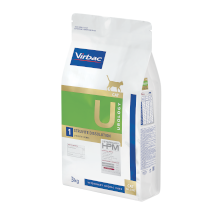Urology - Struvite Dissolution Cat Food
- Strüvit taşlarının hızlı çözünmesini ve oksalat oluşum riskinin azaltılmasını sağlar
- İdrar hacmini ve idrara çıkışı artırır
- Alt idrar yolu iltihabını azaltır
Mevcut ambalajlar:
- 1,5 kg
- 3 kg
Köpekler ve kediler, sağlık durumlarına bakılmaksızın etoburdur. VETERİNER HPM Klinik Mamalar, proteinin% 90'ı hayvansal kaynaklı olan, yüksek protein ve düşük karbohidrat (HP-LC) formülasyonuna dayanmaktadır.
Kurutulmuş domuz ve kümes hayvanı proteinleri, patates nişastası, hidrolize domuz ve kümes hayvanları proteinleri, hayvansal yağlar, mineraller, bezelye, bakla kabuğu, pirinç, pancar küspesi, keten tohumu, bira mayası, balık yağı, lignoselüloz, pisilyum lif (Plantago (L.) spp.), fruktooligosakkaritler, hidrolize kabuklu deniz canlıları (kitosan kaynağı), kondroitin sülfat, Lactobacillus acidophilus.
VETERINARY HPM® hiçbir suni tatlandırıcı veya renklendirici içermez.
|
Analitik bileşenler |
|
|---|---|
| Moisture | 5,5 % |
| Protein | 44 % |
| Animal to vegetal protein ratio | 90/10 |
| Fat | 16 % |
| Minerals | 7,5 % |
| Crude Fibre | 4 % |
| NFE * | 23 % |
| Starch | 15 % |
| Calcium | 0,65 % |
| Phosphorus | 0,65 % |
| Sodium | 1,3 % |
| Potassium | 0,7 % |
| Magnesium | 0,08 % |
| Chloride | 1,8 % |
| Sulphur | 0,7 % |
| Methionine + Cystine | 1,5 % |
| Omega-6 | 2,5 % |
| Omega-3 | 1 % |
| EPA + DHA | 0,3 % |
| ME** calculated | 397 kcal/100g |
| ME** measured in vivo | 385 kcal/100g |
| * Nitrogen Free Extract: Carbohydrates ** Metabolisable energy |
|
| Functional ingredients | |
|---|---|
| Bentonite | 0,5 % |
| Killed Lactobacillis | 7 mg/kg |
| L-carnitine | 540 mg/kg |
| Potassium citrate | 0,3 % |
| Chitosan | 800 mg/kg |
| Vitamins and trace minerals | |
|---|---|
| Vitamine A | 17 000 IU/kg |
| Vitamine D3 | 1 700 IU/kg |
| Vitamine E | 610 mg/kg |
| Vitamine K3 | 0,22 mg/kg |
| Vitamine B1 | 11,2 mg/kg |
| Vitamine B2 | 8 mg/kg |
| Vitamine B3 | 113,4 mg/kg |
| Vitamine B5 | 14,5 mg/kg |
| Vitamine B6 | 7,6 mg/kg |
| Vitamine B8 | 0,15 mg/kg |
| Vitamine B9 | 1,9 mg/kg |
| Vitamine B12 | 0,046 mg/kg |
| Choline | 1 760 mg/kg |
| Taurine | 2 460 mg/kg |
| Cuivre | 12 mg/kg |
| Iode | 0,4 mg/kg |
| Zinc | 110 mg/kg |
Günlük beslenme tablosuna uyulması ve temiz su bulundurulması tavsiye edilir.
| VÜCUT AĞIRLIĞI (KG) |
GÜNLÜK BESLENME (G/GÜN) |
||
|---|---|---|---|
|
FAZLA KİLOLU YAVAŞ KİLO KAYBI |
Normal* |
DÜŞÜK KİLOLU |
|
| 2 | 20 | 20 | 25 |
| 3 | 30 | 35 | 35 |
| 4 | 40 | 45 | 50 |
| 5 | 50 | 55 | 60 |
| 6 | 60 | 65 | 75 |
| 7 | 70 | 75 | 85 |
| 8 | 75 | 85 | 95 |
| 9 | 85 | 100 | 110 |
| 10 | 95 | 110 | 120 |
|
*İdeal vücut ağırlığına sahip kısırlaştırılmış yetişkin ev kedisi. Günlük beslenme miktarı, kedinin mevcut vücut ağırlığına göre belirlenir ve her ay ayarlanması gerekir. |
|||
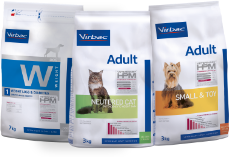
- Yavru kedimi ev yemeği ile besleyebilir miyim?
Yavru kedilerin ilk yılları boyunca aldıkları besinlerin iskelet, kas ve tüm yeni dokuları oluşturmak için enerji ve madde sağlaması gerektiği açıktır. Ancak beslenme bununla sınırlı değildir: yavru kedilerin tam olarak işleyen bir sinir sistemi ve etkili bir bağışıklık sistemi geliştirmelerine de yardımcı olmalıdır. Bu çok hassas dönemde temel besin maddelerinde (hayvanın vücudu tarafından sentezlenemeyenler) herhangi bir eksiklik, kedinin gelecekteki sağlığını etkileyebilir.
Yavru kedileri için beslenme açısından dengeli bir ev yemeği hazırlamak isteyen kedi sahipleri için veteriner hekim beslenme uzmanları tarafından geliştirilen birçok tarif mevcuttur. Bununla birlikte, gerekli tüm koşullara uymayı başarmak yanıltıcıdır; çünkü ev tipi bir rasyonun besin dengesi çeşitli tehlikelere tabidir. Sahibi her zaman tarifi tam olarak takip etmekte zorlanacaktır, gerekli malzemeler her zaman mevcut değildir ve malzemelerin besin bileşimi ürünün kaynağına bağlı olarak önemli ölçüde değişebilir. Ev yemeği hazırlarken hiçbir laboratuvar analizi, kullanılan hammaddelerin besin bileşimini doğrulayamaz!
Bu nedenle, bir mineral ve vitamin takviyesi ile birlikte olsa bile, kediler için ev yapımı yemekler genellikle kolin, demir ve tiamin gibi çeşitli besin maddelerinde eksiklikler gösterir. Buna ek olarak, kediler insanlar gibi D vitamini sentezleyemez (UV ışınlarına maruz kalarak) ve bu vitaminin beslenmede günlük olarak sağlanması gerekir.
- Yavru kedimi vejetaryen besleyebilir miyim?
Kedi zorunlu etoburdur, bu da ihtiyaç duyduğu bazı besinlerin bitki bazlı bir diyetle sağlanamayacağı anlamına gelir. Bu tür diyetler, sağlık üzerinde ciddi sonuçları olan büyük beslenme eksikliklerine neden olabilir. Bu nedenle, yavru bir kedi asla vejetaryen beslenmemelidir.
- Yavru kedimi çiğ et ile besleyebilir miyim?
Çiğ et (kırmızı et veya tavuk) genellikle kalsiyum ve fosfor açısından yetersizdir. Kalsiyum/Fosfor oranı, özellikle kemik büyümesi açısından kedi türleri için tamamen uygunsuzdur. Böyle bir diyet, sağlık üzerinde ciddi sonuçları olan önemli beslenme eksikliklerine neden olabilir. Yavru kedi, yalnızca çiğ etle beslendiğinde küçük travmalarda bile patolojik kırık riskine maruz kalabilir.
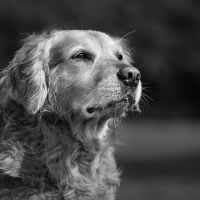
10 veterinerin en az altısı mamamızı tavsiye ediyor
(Kaynak: GIE AC 2020 anketi, 1519 yanıt)
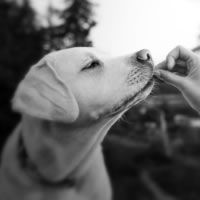
Ortalama olarak, mamamıza 4/5'in üzerinde puan verilmiştir.
(Kaynak: * conso animo, shopmium, que choisir and 60 millions conso)
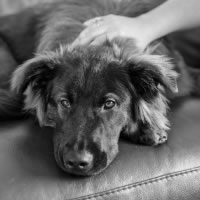
Orta ve büyük boy köpekler için %94, küçük ve çok küçük boy köpekler için %92 ve kediler için %84 kabul oranı


